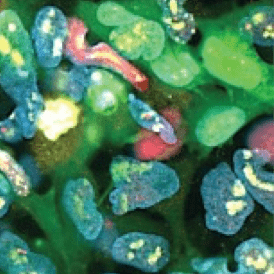
Even though neurodegenerative diseases often strike in middle age or later, patients could have structural differences in their brains that arise before birth. In a new study in Cell Reports, USC Stem Cell scientists used both patient-derived nerve cells and laboratory mice to demonstrate that the most common genetic cause of amyotrophic lateral sclerosis (ALS) and frontotemporal dementia (FTD) impairs neural stem cells and reduces the size of two key regions of the brain during embryonic development.
“We are only beginning to understand how neurodevelopment in an embryo can contribute to neurodegeneration in an adult,” said the study’s corresponding author Justin Ichida, who is the John Douglas French Alzheimer’s Foundation Associate Professor of Stem Cell Biology and Regenerative Medicine at the Keck School of Medicine of USC, and a New York Stem Cell Foundation-Robertson Investigator. “Our study offers some suggestive evidence of how this might occur in the context of ALS and FTD.”
To read more, visit https://stemcell.keck.usc.edu/als-and-frontotemporal-dementia-show-origins-in-utero.